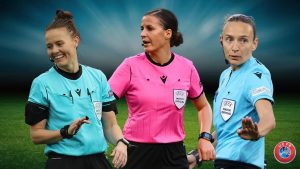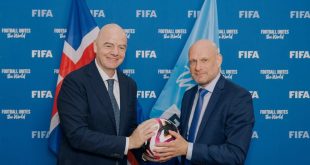 As the profile of women’s football in Europe continues to rise, so too does that of its referees, who continue to break new ground across the continent and beyond.
As the profile of women’s football in Europe continues to rise, so too does that of its referees, who continue to break new ground across the continent and beyond.
As we mark the week of International Women’s Day and prepare for the forthcoming quarter-finals of the UEFA Women’s Champions League, we speak to three of the best in the business, each with their own perspective to share.
North Macedonia’s Ivana Projkovska is a talented former player who has risen through the ranks as a top official in one of Europe’s smaller national associations, fulfilling her dream of refereeing at UEFA Women’s EURO 2022 last summer.
Fellow Women’s EURO official Rebecca Welch is England’s leading female referee, recently becoming the first woman to take charge of a men’s second-tier match in the country.
An elite referee since 2013, Hungarian Katalin Kulcsár gave birth to a baby boy in July 2022. Already back on the pitch in domestic action, she has returned to VAR duty with UEFA and was recently reunited with her colleagues from across Europe at our elite referees winter course in Rome.
Sitting down with UEFA Media, the trio discussed their journeys so far, the challenges they have overcome and the attraction of refereeing.
What first attracted you to refereeing?
Katalin Kulcsár: I started refereeing when I was 15. My father was a referee, and had a very nice community within refereeing, and I loved that. As a girl at that time, there was no real chance to play football. So, this was my chance to be in football, and I wanted to be in football.
Rebecca Welch: I was a little bit older – I was 27 when I started. I had a really good friend who was a referee, I never really understood why you’d want to be. But then as soon as I’d done the course and started refereeing, I fully understood why people make the choice to become a referee.
Ivana Projkovska: I became a referee by accident. I played football for a long time, as a left-winger or as a striker, and I was constantly getting punished for being in an offside position. I wasn’t happy with the referee’s and the assistant referee’s decision, and I don’t want to say that I fought with them, but I refused to accept their decisions. So, one day, the referee in our game told me that I should become one and see things from their point of view. And on the very next course for new referees, I applied, and since then, I am a referee.
What are the best things about being a referee?
Welch: It’s really difficult to pinpoint before you do it and then when you’re walking out at three o’clock on a Saturday, as it is in England, you’re involved in football and having the best seat in the house. I played football but I was never really that good, so my progression in the game would’ve stopped. As a referee, you’ve got the chance to go on and referee in professional women’s leagues, professional men’s leagues. So, that’s definitely the reason why I keep doing it: that buzz at three o’clock when I walk out.
Kulcsár: I like the community, I like being in the refereeing family. I like the challenge; it’s never the same. The same situations don’t happen one after another, every game is a new thing. You have to focus; you have to face new things, meet new people. And I like the challenge – I like to have a challenge in football.
Projkovska: I love being a referee because of all the challenges that come with it. It’s a lot of work, we have to train a lot, be professional. We have to do many things at once: running, make the right decision, read the game, communicate with the players, the coaches, and work with other colleagues.
What are the biggest challenges you have faced so far in your refereeing career?
Kulcsár: The biggest challenge I faced is being a woman in the men’s game. Because when I started, I was a kid, I was 15 years old; I didn’t really think about being a woman, but I realised, when I was 20-something, that I was the only one on the pitch that was a woman and not a man. This was a hard one. But then, I loved refereeing, I loved the game and loved being there, so I wouldn’t have stopped just because I was a woman among men. Being a girl in football was harder, or more difficult, 10, 20, 30 years ago; but I can see through my own career that it’s getting much, much easier. I feel that we have more respect from the younger generation, which is a great step forward. Obviously, the fitness challenges are very high, as women we need to work very hard to meet the requirements.
How do you learn to cope with criticism?
Projkovska: Usually, older referees give us support, telling us that we should keep working, that we cannot achieve everything in one day, and that one day, we will be very successful and then people will respect us.
Welch: The biggest support I’ve had is from my mum and dad. I’m very lucky in that respect, where my dad comes to most of my games, so he’s always there. He was never a referee, but he now knows a lot about refereeing through me. My mum’s philosophy is, “As long as you go out and you do your best, I can’t ask for anything more.” My mum doesn’t know a lot about football, so she always just thinks if I go out and do my best, then she’s happy. They’re always there on the good days but also, more importantly, on the bad days to help pick me up and keep me going.
Katalin, how does it feel to be resuming your career after pregnancy?
Kulcsár: I said the biggest challenge is being a woman in the men’s game, but I find motherhood an even bigger challenge, which I’m facing right now, coming back from pregnancy. Up until now, there haven’t really been many examples of this at the top level – in elite refereeing – where someone was returning to the same level after having a baby. I’ve been a referee for 24 years, so this is the ‘normal’ me, and I love being back. I hope that with this comeback, I can be a good role model for the next generation: the fact that one can continue with their career, alongside having a family, and going back to performing at a high level again, where they previously achieved success.
What is your advice for young women and girls thinking of getting involved in refereeing?
Projkovska: They should never stop, follow their dreams, work hard and never listen to negative people around them. Stay positive and everything is possible. If I have achieved some of my goals, they can follow me and achieve their goals.
Kulcsár: For either girls or boys, refereeing is a type of career or hobby – depending on how one looks at it or how far one goes – where they can be a part of football and attend matches. If someone likes football and would like to be a part of it, refereeing is also a way in. Perhaps this is the closest to football after being an actual player. There’s always something new in store for us and we’re in the middle of these matches – we don’t see it from a distance as the fans or anyone else does.
 Arunava about Football A look at football & the world through my eyes!
Arunava about Football A look at football & the world through my eyes!



